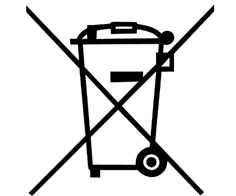Guidance for the collection of sWEEE
How to prepare for the new requirement
Small electricals product audit
To understand what small electrical items you have and the best way of managing your obligation to separate them for onwards recycling, it would be good to conduct a review or audit of eligible items currently in use in your workplace that may need to be disposed of and recycled in the future. This could include understanding the expected life span of your existing electrical item/s and investigating if the existing item/s can be refurbished to extend their useful life.
A small electrical item is anything with a plug, battery or cable that is less than 50 centimetres on its longest edge. You can also look for the wheelie bin logo (figure 1) to help identify small electrical items.

Figure 1
Carrying out such an audit could help you decide, for example, if you may require a sWEEE collection, what type of collector would be best for you, how often you may need a collection, or whether dropping off your items to a store or recycling centre is a better option for your workplace (see ‘How to Recycle sWEEE’ section).
Once you have completed a review of the small electrical and electronic items in use, it would also be useful exercise to periodically review your existing general waste and recycling bins for small electrical items.
This could help you identify, for example, whether staff are using the bins to incorrectly dispose of sWEEE, pointing to the need for action, such as staff training, additional or clearer signage, or provision of a separate container for sWEEE if you don’t already have one.
If you have public facing bins, for example leisure and entertainment businesses, it may be necessary to conduct a waste audit of these bins to identify any sWEEE being disposed of incorrectly by guests or visitors. For example, general waste bins at caravan and campsites may find small items such as electric fans, children’s toys or lights that will need to be placed separately in their own sWEEE container for collection.
Preparing staff
It is important that all staff are aware that small waste electricals should not be disposed of in general (black bag) waste or other recyclable waste bins and how and where they should be stored instead prior to either collection or transport to a permitted waste facility.
To help with staff engagement, it may be helpful to explain the risks associated with placing small electricals in bins and the benefits of recycling them instead.